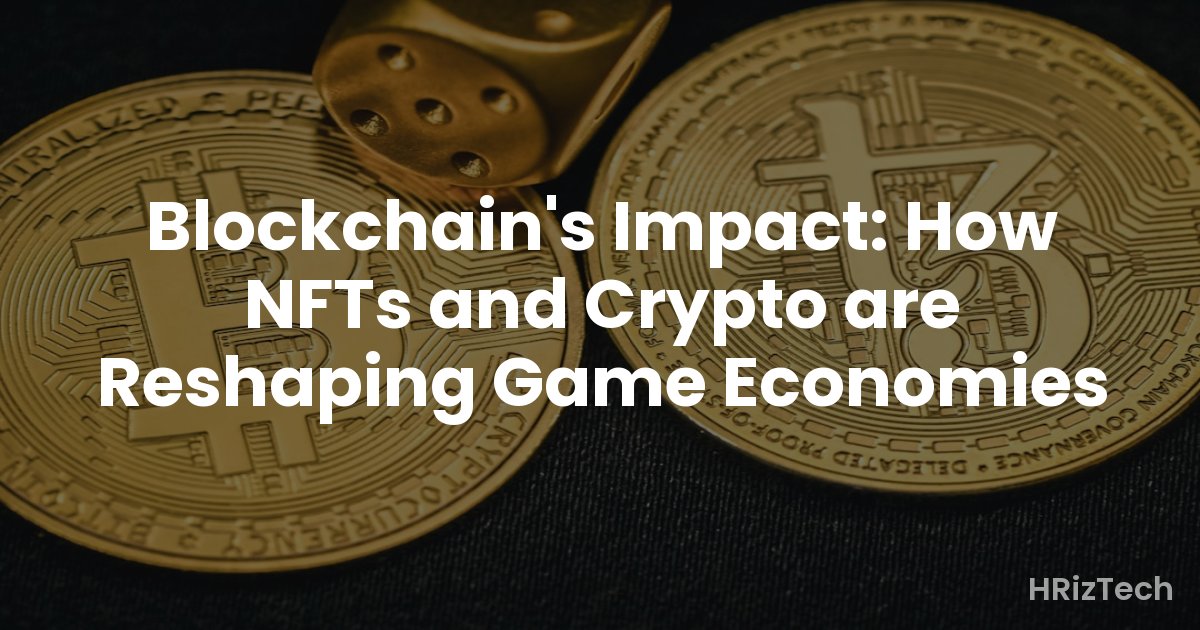Blockchain's Impact: How NFTs and Crypto are Reshaping Game Economies

Blockchain's Impact: How NFTs and Crypto are Reshaping Game Economies
- NFTs are transforming in-game asset ownership and trading.
- Cryptocurrencies are introducing new monetization models for players and developers.
- Blockchain technology enhances transparency and security in game economies.
- Play-to-earn models are creating new economic opportunities.
- Challenges remain regarding scalability, regulation, and environmental impact.
The Rise of In-Game Assets as NFTs
For years, gamers have poured countless hours and real-world money into acquiring virtual items within their favorite games. These items – from powerful weapons and rare skins to unique characters and digital land – often held significant value within the game's ecosystem, but their ownership was ultimately controlled by the game developers. Enter Non-Fungible Tokens (NFTs), and the game changed forever. NFTs, thanks to their unique identification on a blockchain, allow for verifiable ownership of in-game assets. This means players can truly own their digital possessions, trade them freely on marketplaces, and even profit from their appreciation in value. This shift has fundamentally altered the relationship between players and game developers, empowering players with unprecedented control over their virtual assets.
The Impact on Game Developers
The introduction of NFTs isn't just a boon for players; it also presents exciting opportunities for game developers. By integrating NFTs into their games, developers can create new revenue streams through direct sales of in-game items and through royalties on secondary market transactions. This opens doors for innovative monetization strategies, potentially reducing reliance on traditional models like loot boxes or microtransactions, which have often faced criticism for their potentially exploitative nature. Furthermore, the ability for players to trade assets freely fosters a more vibrant and engaged community, driving player retention and attracting new audiences.
Cryptocurrencies Fueling Game Economies
Beyond NFTs, cryptocurrencies are playing a pivotal role in reshaping game economies. Many games now utilize their own in-game cryptocurrencies, allowing players to earn rewards for their participation, complete quests, or simply by playing the game. This "play-to-earn" (P2E) model has exploded in popularity, attracting millions of players globally and creating new economic opportunities in developing countries.
Play-to-Earn and its Implications
The P2E model is not without its challenges. Concerns have been raised about the sustainability of these systems, the potential for exploitation, and the environmental impact of the energy-intensive process of mining some cryptocurrencies. However, the underlying concept of rewarding players for their time and effort represents a significant paradigm shift in the gaming industry, challenging the traditional notion of games as purely entertainment, and instead positioning them as potential sources of income.
Blockchain's Role in Enhanced Transparency and Security
The underlying technology powering NFTs and cryptocurrencies, blockchain, offers significant advantages in terms of transparency and security. The immutable nature of the blockchain ensures that all transactions are recorded permanently and are auditable by anyone. This drastically reduces the risk of fraud, manipulation, and unauthorized changes to in-game assets. The increased transparency also fosters trust between players, developers, and marketplaces, creating a more robust and reliable ecosystem.
Addressing the Challenges
Despite the numerous benefits, the integration of blockchain technology into game economies presents several challenges. Scalability remains a key concern, as blockchain networks can struggle to handle the high transaction volumes generated by large-scale games. Regulatory uncertainty is another significant hurdle, with governments worldwide grappling with how to regulate cryptocurrencies and NFTs. Finally, the environmental impact of some blockchain networks cannot be ignored, prompting the industry to explore more sustainable solutions like proof-of-stake consensus mechanisms.
The Future of Game Economies: A Blend of Innovation and Regulation
The integration of NFTs, cryptocurrencies, and blockchain technology is fundamentally reshaping the economics of the gaming industry. While challenges remain, the potential benefits are undeniable. The shift towards player-owned assets, novel monetization models, and enhanced transparency is poised to drive innovation and create new opportunities for both players and developers. The future will likely see a more balanced ecosystem, where the benefits of blockchain technology are harnessed responsibly, while addressing concerns around sustainability, scalability, and regulation.
Key Takeaways
- NFTs provide verifiable ownership of in-game assets.
- Cryptocurrencies enable new play-to-earn models.
- Blockchain enhances transparency and security.
- Scalability, regulation, and environmental impact are key challenges.
The integration of blockchain into gaming is still in its early stages. What innovative applications of this technology do you foresee shaping the future of game economies?
Comments
No comments yet. Be the first to comment!